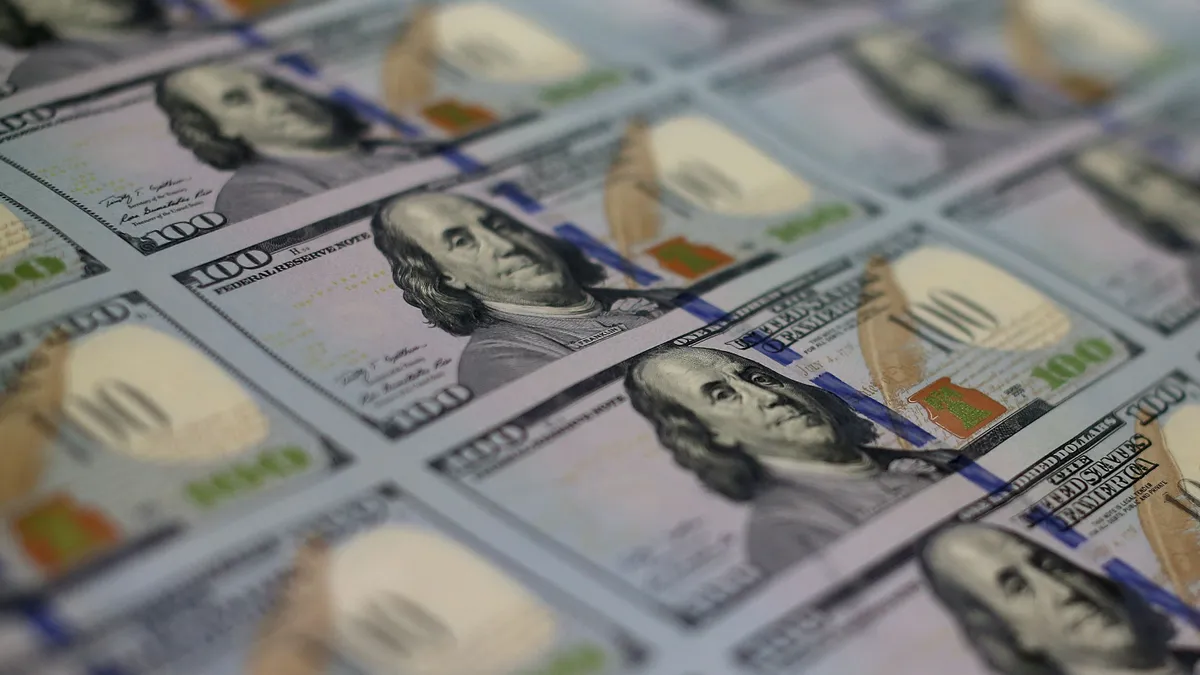Dive Brief:
- Investment banking underwriters could see their bonuses jump 30% to 35% this year, compared with 2020, adding up to the largest single-year compensation bump since 2009, pay consultancy Johnson Associates said in a report Tuesday.
- Equities traders and investment banking advisers may also see a 20% to 25% year-over-year jump in their bonuses, the company said.
- A flurry of deals and a fertile crop of initial public offerings have shifted the power dynamic as banks near year-end, when they disburse performance-based incentives. The swell of activity has translated to bigger workloads for Wall Street bankers but also to mounting concerns that top talent may jump to a competitor if the price of perks isn’t right.
Dive Insight:
The expected jump in bonus pay comes a year after several big banks tread cautiously around the idea of boosting compensation amid a pandemic. Bank of America, for example, suggested keeping its 2020 bonus pool flat for sales and trading despite a 20% boost in revenue during the year's first nine months. Citi kept its pool at 2019 levels last year in equities but gave bond traders a bump of at least 10%. JPMorgan Chase discussed increasing variable compensation by 15% to 20% for traders — in a year when the sector saw a 48% jump in revenue.
Morgan Stanley proved an exception, opting last bonus season to give a one-time $1,000 incentive to most of its employees who earn less than $150,000 a year.
For 2021, Johnson Associates said, the bonus bump should extend well beyond investment banking and equities. Private-equity bankers could see bonuses of 12% to 20% depending on the size of the firm, the consultancy said. Asset-management bankers could see a 12% to 18% bonus bump. Bankers serving hedge funds or high-net-worth clients are predicted to see 10% to 15% jumps in bonuses. Retail and commercial banking positions may see 5% increases, the company said.
This year may prove somewhat of a peak, however, Alan Johnson, managing director of Johnson Associates, told CNBC. While business activity should remain strong in 2022 — keeping incentives relatively high, growth may slow, he said.
"I don’t think [bonuses] are going to go up as much next year. ... I think this was a spurt," Johnson told CNBC. "But the view is '22 will be a really good year."
Recruiting company Options Group gave a slightly less rosy outlook — predicting more than 20% jumps for equity-derivatives and prime-finance traders, and increases around 16% for cash-equities traders, according to Bloomberg. Commodities, credit and securitized-products traders may see single-digit increases, but traders in foreign exchange and emerging markets could see compensation fall more than 7%, the company said.
"People are expecting Santa will bring a big paycheck in their stocking this year," Options Group CEO Mike Karp told the wire service. "But reality is different than perception and some stockings won’t be as heavy."
Bonuses aren’t the only compensation category set for an uptick, though, Johnson said, adding that base salaries across financial services could see a swell of 3% — and in some cases, more than 7%.
"There is a staffing shortage, so in addition to the pay levels, there’s a real demand for talent," Johnson told The New York Times. "When you have a crisis, you usually have a lull in turnover, people get risk-averse, hold onto their jobs, hunker down … But as we go to the middle of '21 and '22, there’s going to be more turnover."
Several banks made preemptive moves this year to sweeten the pot for junior investment bankers after more than a dozen Goldman Sachs analysts in March described to their managers "inhumane" 100-hour workweeks, deteriorating physical and mental health and a souring outlook for the future.
Bank of America kick-started the salary one-upmanship in April, when it gave $10,000 raises to analysts and an extra $20,000 to associates and vice presidents. It followed that up in August with a second raise that brought first-year pay from $95,000 to $100,000.
Wells Fargo boosted base salaries for its first-, second- and third-year analysts by $15,000 — to $100,000, $105,000 and $110,000 respectively.
JPMorgan Chase, Citi, Barclays, Deutsche Bank and Morgan Stanley also raised entry-level pay to the $100,000 threshold.
Goldman Sachs then bumped its salary for entry-level investment bankers to $110,000 — a price point Morgan Stanley later matched.














